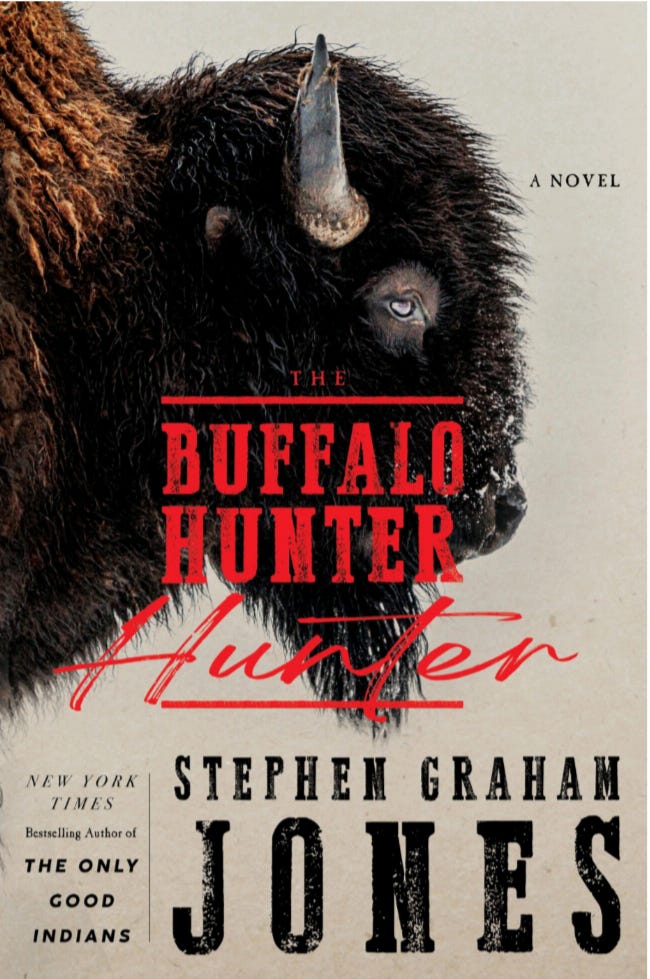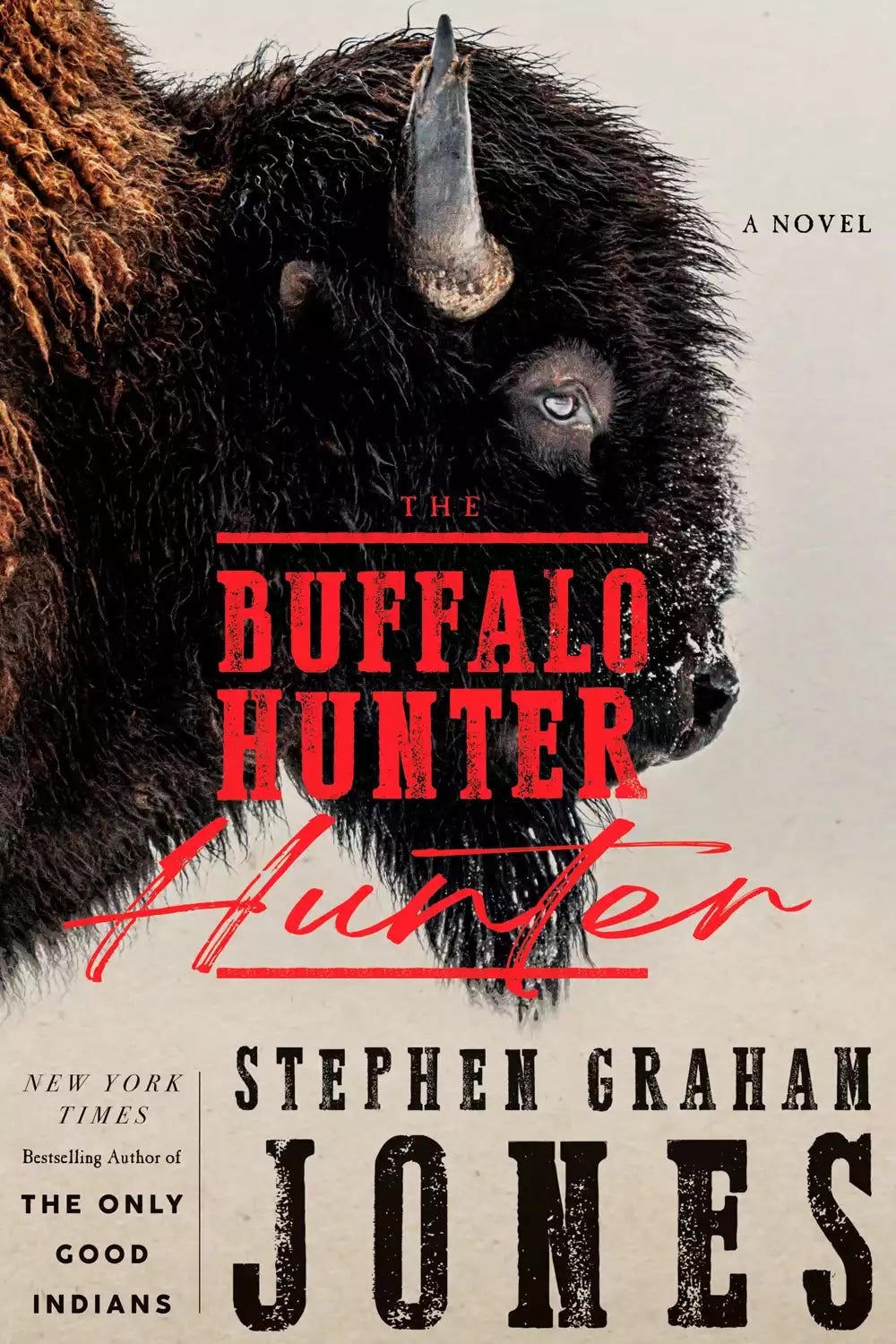The Buffalo Hunter Hunter (2025) by Stephen Graham Jones
The matter of the matter of North America
Readers unfamiliar with The Buffalo Hunter Hunter may wish to read my notes only after reading the novel.
In about 400 pages, Stephen Graham Jones takes us to live in another world. As readers, we are excited there, content to embrace a story both tragic and enraging.
The Buffalo Hunter Hunter consists of three narrative seams: contemporary, 1912, and before 1912. By the end of the novel, it's hard to pick which we relish more. The contemporary narrator has the most thankless job: making the beginning, introducing herself, and "finding the manuscript" that will reward us with the 1912 and pre-1912 voices. Because she is middle-aged, childless, husbandless, and tenureless, the reader is at risk of tiring of her small-bore histrionics.
Happily, Jones shifts and fully engages as the historical sections of the narrative begin.
The geography of The Buffalo Hunter Hunter enthralls. The found-manuacript’s two male voices, an old preacher and a young member of the Pikuni tribe, may have braided fates that unfold in Montana, but it is not a Montana we know. The nomenclature is foreign: even allusions and map-reader shorthand are different. This is gloriously energizing. Like a new reader of Patrick O’Brian, we will risk sinking just to be allowed to swim in this world of verbal richness.
The Buffalo Hunter Hunter is about the “matter of North America.” Like Steve Duffy’s brilliant 2008 novella “The Clay Party,” The Buffalo Hunter Hunter is about men who push frontiers. They push by arms, by leveraging disease and famine, by back-shooting and general carnage, all the wild gambling that they will never be called to account and ordered make a statement defending their motivations.
Movement in and over land, as characters become part of the land, makes for bold and memorable moments in The Buffalo Hunter Hunter. The character Good Stab finds he becomes more like the animals and humans he takes.
When hibernating with a bear, he shares its dreams as his own.
With Sun Chief’s next rising, I nodded off, moved my shoulders back into the frozen dirt crumbling over me, and when I woke at nightfall, I had moved deep back in my sleep. All the way to alongside the real-bear, down for the winter’s long sleep.
It was breathing slow, and, lying with my chest up to it, my breathing went like the real-bear’s, deep and slow, and the next time I woke, not even aware I’d been asleep, my mouth was latched onto the bear’s hump, just biting in shallow.
My new teeth had punctured in, but not deep. Just enough for some of its winter fat shot through with veins of blood to coat my mouth but not go down my throat.
I closed my eyes, didn’t pull away, and this was the only good thing to happen to me since kicking into that beaver lodge. I couldn’t dream anymore, which is a banishment no Pikuni would choose over dying, but, with my mouth fixed on this real-bear, I could taste its dreams, which was all one long dream that never stopped.
It wasn’t pictures and faces like mine had used to be, it was sounds and tastes, but what the bear was dreaming wasn’t sounds and tastes, it was how those things felt. It was a fullness of smells, and snuffling, and rustling deeper, and the bursting of small, tight skins in a mouth, followed by coolness, and sweetness, and the satisfaction that there was going to be more of this, and then more after that.
What real-bears dream about, it’s ripe berry bushes.
This is how I passed the winter.
But it only works with real-bears. It’s because they used to be people. If blackhorns slept like that, all closed in, all winter, I would like to ride their dreams with them, I think.
If there were any left to dream with.
I woke in Geese Moon not biting into that real-bear anymore, but it biting into me. My shoulder was in that real-bear’s mouth. The real-bear wasn’t all the way awake yet, but it knew in its sleep way that it wasn’t alone like it had been when it nosed down into this place.
The Buffalo Hunter Hunter is a novel about exacting costs, and about assuming the mantle of exactor and punisher. Good Stab’s transformation has left him good for nothing else. He smells – and samples – truths carried like a scent on the night wind.
At first the men’s voices were angry and yelling and they were passing a bottle around, one that was making their voices louder and angrier.
Good, I said to myself in the foul darkness where they would come to sleep.
But when they came in, it wasn’t to sleep.
Two of the hide-hunters were dragging one of the skinner boys in, and he was crying and fighting and drunk from what they’d been making him drink.
The hide-hunters pulled the boy’s pants down and bent him over one of their knees, and the other one dropped down behind him, was untying his pants that were sticky with blackhorn blood. The hide-hunter smelled like greased-shooter powder and smoke and death and hard yellow milk, which he had a handful of, to use, and when he forced his way into the boy, the boy screamed like his throat was full, like it had a whole fist in it coming up from his belly, and his eyes cried and red shot through them in cracks all at once, and the other hide-hunter laughed and patted the boy on the back like to help him through what was happening to him, and that was when I came at them.
I tore the man in front’s throat out so deep that his head fell behind and touched his back, and he hadn’t fallen over yet when I bit into the chest of the hide-hunter who had smeared the hard yellow milk on himself. But then at the last moment I remembered that I was Pikuni, and wanted to stay that way, so I couldn’t even start to let his blood into my mouth, because I wouldn’t be able to stop.
Instead I grabbed his jaw and pulled it down hard and fast, tearing it off except for one side of skin, and he tried to scream but could only stand to try to get away from the pain. When he stood it brought the boy up with him, until the boy fell off onto his face.
When another hide-hunter called in asking a question that sounded like a joke, I pushed my fingers into the jawless one’s eyes and pulled both ways, splitting his head down the middle. His body jerked, both from dying and from finishing, and he held his bottle upright without spilling the whole time he was dying.
The Buffalo Hunter Hunter depicts a portion of the birth of a nation that – to quote observer Karl Marx – came into the world “dripping from head to toe, from every pore, with blood and filth.” At several turns, its protagonists are asked to defend the process, to declaim its worthwhileness.
Like Tananarive Due’s 2023 novel The Reformatory, The Buffalo Hunter Hunter explores unwholesome contradictions of U. S. history. Art of such power is one way past conduct may be absolved by solidarity.
Jay
27 March 2025






Thanks, Jay. I will see if our library has this one.